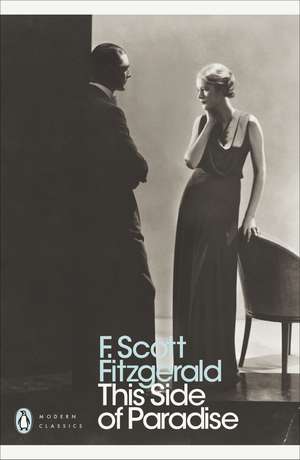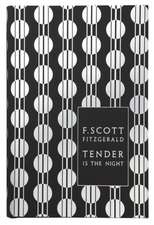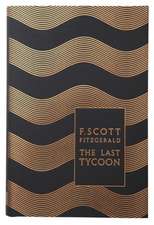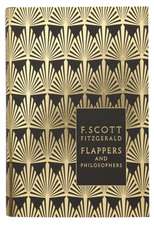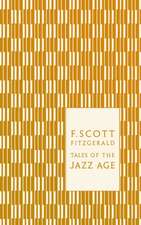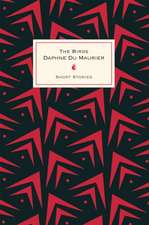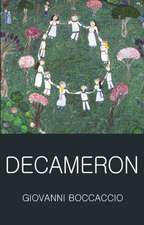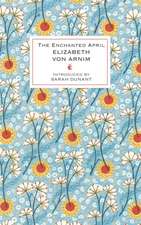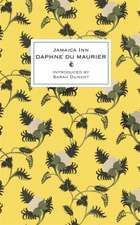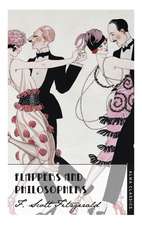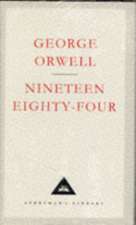This Side of Paradise: Penguin Modern Classics
Autor F. Scott Fitzgeralden Limba Engleză Paperback – 24 ian 2001
| Toate formatele și edițiile | Preț | Express |
|---|---|---|
| Paperback (54) | 40.20 lei 3-5 săpt. | |
| Penguin Random House Group – 28 apr 2010 | 40.20 lei 3-5 săpt. | |
| e-artnow – 2 iul 2022 | 47.36 lei 3-5 săpt. | |
| Barnes & Noble – 6 mar 2013 | 48.42 lei 3-5 săpt. | |
| CREATESPACE – | 48.68 lei 3-5 săpt. | |
| Alma Books COMMIS – 26 sep 2012 | 51.85 lei 3-5 săpt. | +11.12 lei 6-12 zile |
| Legends Press – 2021 | 52.55 lei 3-5 săpt. | +13.27 lei 6-12 zile |
| Penguin Books – 24 ian 2001 | 53.34 lei 21-33 zile | +19.37 lei 6-12 zile |
| OUP OXFORD – 28 mai 2020 | 53.42 lei 10-17 zile | +19.50 lei 6-12 zile |
| UNION SQUARE & CO – 12 sep 2023 | 53.81 lei 3-5 săpt. | +15.36 lei 6-12 zile |
| – | 54.73 lei 3-5 săpt. | |
| CreateSpace Independent Publishing Platform – | 55.95 lei 3-5 săpt. | |
| CreateSpace Independent Publishing Platform – | 64.04 lei 3-5 săpt. | |
| Greenbook Publications, LLC – 31 iul 2010 | 64.50 lei 3-5 săpt. | |
| Mint Editions – apr 2021 | 70.42 lei 3-5 săpt. | |
| Vintage Books USA – 31 aug 2009 | 71.35 lei 3-5 săpt. | |
| CREATESPACE – | 72.01 lei 3-5 săpt. | |
| – | 82.51 lei 3-5 săpt. | |
| – | 82.51 lei 3-5 săpt. | |
| CREATESPACE – | 83.13 lei 3-5 săpt. | |
| – | 86.19 lei 3-5 săpt. | |
| Scribner – 30 iun 1998 | 91.51 lei 3-5 săpt. | |
| Globe Pequot Publishing Group Inc – mai 2004 | 92.53 lei 3-5 săpt. | |
| Denton & White – | 94.73 lei 3-5 săpt. | |
| – | 95.85 lei 3-5 săpt. | |
| CREATESPACE – | 97.84 lei 3-5 săpt. | |
| – | 97.99 lei 3-5 săpt. | |
| CREATESPACE – | 98.06 lei 3-5 săpt. | |
| Penguin Books – 29 feb 1996 | 102.40 lei 3-5 săpt. | |
| Urban Romantics – 7 ian 2017 | 121.30 lei 3-5 săpt. | |
| CREATESPACE – | 124.88 lei 3-5 săpt. | |
| CREATESPACE – | 134.61 lei 3-5 săpt. | |
| Outlook Verlag – 24 sep 2019 | 267.96 lei 3-5 săpt. | |
| CREATESPACE – | 64.82 lei 6-8 săpt. | |
| Digireads.com – 19 mai 2016 | 76.04 lei 6-8 săpt. | |
| – | 80.75 lei 6-8 săpt. | |
| – | 80.75 lei 6-8 săpt. | |
| – | 84.00 lei 6-8 săpt. | |
| LIGHTNING SOURCE INC – 25 sep 2018 | 86.34 lei 17-24 zile | |
| CREATESPACE – | 89.41 lei 6-8 săpt. | |
| SMK Books – 20 oct 2010 | 92.61 lei 6-8 săpt. | |
| Bottom of the Hill Publishing – 31 aug 2014 | 105.77 lei 6-8 săpt. | |
| Bibliotech Press – 2 mai 2019 | 112.97 lei 6-8 săpt. | |
| Bibliotech Press – 7 feb 2012 | 113.10 lei 6-8 săpt. | |
| 1ST WORLD LIB INC – 30 sep 2008 | 113.79 lei 6-8 săpt. | |
| Rupa Publications – 5 ian 2013 | 113.91 lei 6-8 săpt. | |
| NuVision Publications – 17 iul 2007 | 115.36 lei 38-45 zile | |
| Martino Fine Books – 4 apr 2019 | 119.11 lei 38-45 zile | |
| Indoeuropeanpublishing.com – 15 iul 2018 | 120.11 lei 6-8 săpt. | |
| Echo Library – 17 iul 2017 | 120.74 lei 38-45 zile | |
| Read & Co. Classics – 20 apr 2011 | 152.47 lei 6-8 săpt. | |
| Simon & Brown – 30 oct 2018 | 201.63 lei 38-45 zile | |
| Simon & Brown – 15 noi 2018 | 215.68 lei 38-45 zile | |
| Vij Books India Private Limited – 20 apr 2023 | 269.89 lei 6-8 săpt. | |
| Cambridge University Press – 18 apr 2012 | 270.31 lei 6-8 săpt. | |
| Hardback (11) | 72.16 lei 21-33 zile | +29.90 lei 6-12 zile |
| Everyman's Library – 26 iun 1996 | 72.16 lei 21-33 zile | +29.90 lei 6-12 zile |
| Penguin Books – 3 noi 2010 | 108.58 lei 3-5 săpt. | +17.55 lei 6-12 zile |
| Scribner – 2 sep 2020 | 110.53 lei 3-5 săpt. | +16.80 lei 6-12 zile |
| Mint Editions – 26 apr 2021 | 122.04 lei 3-5 săpt. | |
| Outlook Verlag – 24 sep 2019 | 409.59 lei 3-5 săpt. | |
| Bibliotech Press – 2 mai 2019 | 211.23 lei 6-8 săpt. | |
| 1st World Publishing – 30 sep 2008 | 213.80 lei 6-8 săpt. | |
| NuVision Publications – 31 ian 2009 | 217.06 lei 38-45 zile | |
| SMK Books – 3 apr 2018 | 233.78 lei 6-8 săpt. | |
| Simon & Brown – 30 oct 2018 | 256.05 lei 38-45 zile | |
| Simon & Brown – 15 noi 2018 | 267.48 lei 38-45 zile |
Din seria Penguin Modern Classics
- 17%
 Preț: 41.41 lei
Preț: 41.41 lei -
 Preț: 82.90 lei
Preț: 82.90 lei -
 Preț: 80.98 lei
Preț: 80.98 lei - 15%
 Preț: 48.87 lei
Preț: 48.87 lei - 17%
 Preț: 52.07 lei
Preț: 52.07 lei - 19%
 Preț: 59.39 lei
Preț: 59.39 lei - 18%
 Preț: 46.05 lei
Preț: 46.05 lei - 17%
 Preț: 52.49 lei
Preț: 52.49 lei -
 Preț: 69.06 lei
Preț: 69.06 lei - 16%
 Preț: 58.66 lei
Preț: 58.66 lei - 17%
 Preț: 51.67 lei
Preț: 51.67 lei -
 Preț: 81.84 lei
Preț: 81.84 lei - 18%
 Preț: 46.25 lei
Preț: 46.25 lei -
 Preț: 97.20 lei
Preț: 97.20 lei - 17%
 Preț: 52.33 lei
Preț: 52.33 lei - 15%
 Preț: 48.90 lei
Preț: 48.90 lei - 16%
 Preț: 53.55 lei
Preț: 53.55 lei - 18%
 Preț: 51.39 lei
Preț: 51.39 lei -
 Preț: 63.28 lei
Preț: 63.28 lei - 16%
 Preț: 53.93 lei
Preț: 53.93 lei - 18%
 Preț: 51.00 lei
Preț: 51.00 lei - 15%
 Preț: 49.40 lei
Preț: 49.40 lei - 15%
 Preț: 55.26 lei
Preț: 55.26 lei - 16%
 Preț: 48.30 lei
Preț: 48.30 lei - 17%
 Preț: 52.10 lei
Preț: 52.10 lei -
 Preț: 81.61 lei
Preț: 81.61 lei - 17%
 Preț: 68.49 lei
Preț: 68.49 lei - 18%
 Preț: 46.25 lei
Preț: 46.25 lei - 18%
 Preț: 46.02 lei
Preț: 46.02 lei - 16%
 Preț: 42.26 lei
Preț: 42.26 lei - 17%
 Preț: 51.66 lei
Preț: 51.66 lei - 16%
 Preț: 48.45 lei
Preț: 48.45 lei - 16%
 Preț: 42.69 lei
Preț: 42.69 lei - 15%
 Preț: 54.63 lei
Preț: 54.63 lei - 18%
 Preț: 46.31 lei
Preț: 46.31 lei - 18%
 Preț: 46.31 lei
Preț: 46.31 lei - 16%
 Preț: 53.59 lei
Preț: 53.59 lei - 16%
 Preț: 53.11 lei
Preț: 53.11 lei -
 Preț: 95.04 lei
Preț: 95.04 lei - 16%
 Preț: 79.93 lei
Preț: 79.93 lei - 18%
 Preț: 46.02 lei
Preț: 46.02 lei - 16%
 Preț: 68.94 lei
Preț: 68.94 lei -
 Preț: 81.35 lei
Preț: 81.35 lei - 17%
 Preț: 51.60 lei
Preț: 51.60 lei - 18%
 Preț: 51.38 lei
Preț: 51.38 lei - 16%
 Preț: 53.36 lei
Preț: 53.36 lei - 18%
 Preț: 50.73 lei
Preț: 50.73 lei - 16%
 Preț: 48.46 lei
Preț: 48.46 lei - 16%
 Preț: 53.37 lei
Preț: 53.37 lei - 17%
 Preț: 52.33 lei
Preț: 52.33 lei
Preț: 53.34 lei
Preț vechi: 63.54 lei
-16% Nou
Puncte Express: 80
Preț estimativ în valută:
10.21€ • 10.66$ • 8.45£
10.21€ • 10.66$ • 8.45£
Carte disponibilă
Livrare economică 14-26 martie
Livrare express 27 februarie-05 martie pentru 29.36 lei
Preluare comenzi: 021 569.72.76
Specificații
ISBN-13: 9780141185576
ISBN-10: 0141185570
Pagini: 304
Dimensiuni: 129 x 198 x 17 mm
Greutate: 0.22 kg
Editura: Penguin Books
Colecția Penguin Classics
Seria Penguin Modern Classics
Locul publicării:London, United Kingdom
ISBN-10: 0141185570
Pagini: 304
Dimensiuni: 129 x 198 x 17 mm
Greutate: 0.22 kg
Editura: Penguin Books
Colecția Penguin Classics
Seria Penguin Modern Classics
Locul publicării:London, United Kingdom
Notă biografică
Recenzii
'Arriving at an accurate and authoritative edition of Fitzgerald could hardly be more worthwhile, and West has done it superlatively. … [he] is doing a tremendously valuable service to Fitzgerald in particular and American literature in general, and we are all in his debt.' Scott Donaldson, The F. Scott Fitzgerald Review
Extras
Book One
The Romantic Egotist
Amory, Son of Beatrice
Amory Blaine inherited from his mother every trait, except the stray inexpressible few, that made him worth while. His father, an ineffectual, inarticulate man with a taste for Byron and a habit for drowsing over the Encyclopædia Britannica, grew wealthy at thirty through the death of two elder brothers, successful Chicago brokers, and in the first flush of feeling that the world was his, went to Bar Harbor and met Beatrice O’Hara. In consequence, Stephen Blaine handed down to posterity his height of just under six feet and his tendency to waver at crucial moments, these two abstractions appearing in his son Amory. For many years he hovered in the background of his family’s life, an unassertive figure with a face half-obliterated by lifeless, silky hair continually occupied in “taking care” of his wife, continually harassed by the idea that he didn’t and couldn’t understand her.
But Beatrice Blaine! There was a woman! Early pictures taken on her father’s estate at Lake Geneva, Wisconsin, or in Rome at the Sacred Heart Convent–an educational extravagance that in her youth was only for the daughters of the exceptionally wealthy–showed the exquisite delicacy of her features, the consummate art and simplicity of her clothes. A brilliant education she had–her youth passed in renaissance glory, she was versed in the latest gossip of the Older Roman Families; known by name as a fabulously wealthy American girl to Cardinal Vitori and Queen Margherita and more subtle celebrities that one must have had some culture even to have heard of. She learned in England to prefer whiskey and soda to wine, and her small talk was broadened in two senses during a winter in Vienna. All in all Beatrice O’Hara absorbed the sort of education that will be quite impossible ever again; a tutelage measured by the number of things and people one could be contemptuous of and charming about; a culture rich in all arts and traditions, barren of all ideas, in the last of those days when the great gardener clipped the inferior roses to produce one perfect bud.
In her less important moments she returned to America, met Stephen Blaine and married him–this almost entirely because she was a little bit weary, a little bit sad. Her only child was carried through a tiresome season and brought into the world on a spring day in ninety-six.
When Amory was five he was already a delightful companion for her. He was an auburn-haired boy, with great, handsome eyes which he would grow up to in time, a facile imaginative mind and a taste for fancy dress. From his fourth to his tenth year he did the country with his mother in her father’s private car, from Coronado, where his mother became so bored that she had a nervous breakdown in a fashionable hotel, down to Mexico City, where she took a mild, almost epidemic consumption. This trouble pleased her, and later she made use of it as an intrinsic part of her atmosphere–especially after several astounding bracers.
So, while more or less fortunate little rich boys were defying governesses on the beach at Newport, or being spanked or tutored or read to from “Do and Dare,” or “Frank on the Mississippi,” Amory was biting acquiescent bell-boys in the Waldorf, outgrowing a natural repugnance to chamber music and symphonies, and deriving a highly specialized education from his mother.
“Amory.”
“Yes, Beatrice.” (Such a quaint name for his mother; she encouraged it.)
“Dear, don’t think of getting out of bed yet. I’ve always suspected that early rising in early life makes one nervous. Clothilde is having your breakfast brought up.”
“All right.”
“I am feeling very old today, Amory,” she would sigh, her face a rare cameo of pathos, her voice exquisitely modulated, her hands as facile as Bernhardt’s. “My nerves are on edge–on edge. We must leave this terrifying place tomorrow and go searching for sunshine.”
Amory’s penetrating green eyes would look out through tangled hair at his mother. Even at this age he had no illusions about her.
“Amory.”
“Oh, yes.”
“I want you to take a red-hot bath–as hot as you can bear it, and just relax your nerves. You can read in the tub if you wish.”
She fed him sections of the “Fêtes Galantes” before he was ten; at eleven he could talk glibly, if rather reminiscently, of Brahms and Mozart and Beethoven. One afternoon, when left alone in the hotel at Hot Springs, he sampled his mother’s apricot cordial, and as the taste pleased him, he became quite tipsy. This was fun for a while, but he essayed a cigarette in his exaltation, and succumbed to a vulgar, plebeian reaction. Though this incident horrified Beatrice, it also secretly amused her and became part of what in a later generation would have been termed her “line.”
“This son of mine,” he heard her tell a room full of awe-struck, admiring women one day, “is entirely sophisticated and quite charming–but delicate–we’re all delicate; here, you know.” Her hand was radiantly outlined against her beautiful bosom; then sinking her voice to a whisper, she told them of the apricot cordial. They rejoiced, for she was a brave raconteuse, but many were the keys turned in sideboard locks that night against the possible defection of little Bobby or Barbara. . . .
These domestic pilgrimages were invariably in state; two maids, the private car, or Mr. Blaine when available, and very often a physician. When Amory had the whooping-cough four disgusted specialists glared at each other hunched around his bed; when he took scarlet fever the number of attendants, including physicians and nurses, totalled fourteen. However, blood being thicker than broth, he was pulled through.
The Blaines were attached to no city. They were the Blaines of Lake Geneva; they had quite enough relatives to serve in place of friends, and an enviable standing from Pasadena to Cape Cod. But Beatrice grew more and more prone to like only new acquaintances, as there were certain stories, such as the history of her constitution and its many amendments, memories of her years abroad, that it was necessary for her to repeat at regular intervals. Like Freudian dreams, they must be thrown off, else they would sweep in and lay siege to her nerves. But Beatrice was critical about American women, especially the floating population of ex-Westerners.
“They have accents, my dear,” she told Amory, “not Southern accents or Boston accents, not an accent attached to any locality, just an accent”–she became dreamy. “They pick up old, moth-eaten London accents that are down on their luck and have to be used by some one. They talk as an English butler might after several years in a Chicago grand opera company.” She became almost incoherent– “Suppose–time in every Western woman’s life–she feels her husband is prosperous enough for her to have–accent–they try to impress me, my dear–”
Though she thought of her body as a mass of frailties, she considered her soul quite as ill, and therefore important in her life. She had once been a Catholic, but discovering that priests were infinitely more attentive when she was in process of losing or regaining faith in Mother Church, she maintained an enchantingly wavering attitude. Often she deplored the bourgeois quality of the American Catholic clergy, and was quite sure that had she lived in the shadow of the great Continental cathedrals her soul would still be a thin flame on the mighty altar of Rome. Still, next to doctors, priests were her favorite sport.
“Ah, Bishop Wiston,” she would declare, “I do not want to talk of myself. I can imagine the stream of hysterical women fluttering at your doors, beseeching you to be simpatico”–then after an interlude filled by the clergyman–
“but my mood–is–oddly dissimilar.”
Only to bishops and above did she divulge her clerical romance. When she had first returned to her country there had been a pagan, Swinburnian young man in Asheville, for whose passionate kisses and unsentimental conversations she had taken a decided penchant–they had discussed the matter pro and con with an intellectual romancing quite devoid of soppiness. Eventually she had decided to marry for background, and the young pagan from Asheville had gone through a spiritual crisis, joined the Catholic Church, and was now–Monsignor Darcy.
“Indeed, Mrs. Blaine, he is still delightful company–quite the cardinal’s right-hand man.”
“Amory will go to him one day, I know,” breathed the beautiful lady, “and Monsignor Darcy will understand him as he understood me.”
Amory became thirteen, rather tall and slender, and more than ever on to his Celtic mother. He had tutored occasionally–the idea being that he was to “keep up,” at each place “taking up the work where he left off,” yet as no tutor ever found the place he left off, his mind was still in very good shape. What a few more years of this life would have made of him is problematical. However, four hours out from land, Italy bound, with Beatrice, his appendix burst, probably from too many meals in bed, and after a series of frantic telegrams to Europe and America, to the amazement of the passengers the great ship slowly wheeled around and returned to New York to deposit Amory at the pier. You will admit that if it was not life it was magnificent.
After the operation Beatrice had a nervous breakdown that bore a suspicious resemblance to delirium tremens, and Amory was left in Minneapolis, destined to spend the ensuing two years with his aunt and uncle. There the crude, vulgar air of Western civilization first catches him–in his underwear, so to speak.
The Romantic Egotist
Amory, Son of Beatrice
Amory Blaine inherited from his mother every trait, except the stray inexpressible few, that made him worth while. His father, an ineffectual, inarticulate man with a taste for Byron and a habit for drowsing over the Encyclopædia Britannica, grew wealthy at thirty through the death of two elder brothers, successful Chicago brokers, and in the first flush of feeling that the world was his, went to Bar Harbor and met Beatrice O’Hara. In consequence, Stephen Blaine handed down to posterity his height of just under six feet and his tendency to waver at crucial moments, these two abstractions appearing in his son Amory. For many years he hovered in the background of his family’s life, an unassertive figure with a face half-obliterated by lifeless, silky hair continually occupied in “taking care” of his wife, continually harassed by the idea that he didn’t and couldn’t understand her.
But Beatrice Blaine! There was a woman! Early pictures taken on her father’s estate at Lake Geneva, Wisconsin, or in Rome at the Sacred Heart Convent–an educational extravagance that in her youth was only for the daughters of the exceptionally wealthy–showed the exquisite delicacy of her features, the consummate art and simplicity of her clothes. A brilliant education she had–her youth passed in renaissance glory, she was versed in the latest gossip of the Older Roman Families; known by name as a fabulously wealthy American girl to Cardinal Vitori and Queen Margherita and more subtle celebrities that one must have had some culture even to have heard of. She learned in England to prefer whiskey and soda to wine, and her small talk was broadened in two senses during a winter in Vienna. All in all Beatrice O’Hara absorbed the sort of education that will be quite impossible ever again; a tutelage measured by the number of things and people one could be contemptuous of and charming about; a culture rich in all arts and traditions, barren of all ideas, in the last of those days when the great gardener clipped the inferior roses to produce one perfect bud.
In her less important moments she returned to America, met Stephen Blaine and married him–this almost entirely because she was a little bit weary, a little bit sad. Her only child was carried through a tiresome season and brought into the world on a spring day in ninety-six.
When Amory was five he was already a delightful companion for her. He was an auburn-haired boy, with great, handsome eyes which he would grow up to in time, a facile imaginative mind and a taste for fancy dress. From his fourth to his tenth year he did the country with his mother in her father’s private car, from Coronado, where his mother became so bored that she had a nervous breakdown in a fashionable hotel, down to Mexico City, where she took a mild, almost epidemic consumption. This trouble pleased her, and later she made use of it as an intrinsic part of her atmosphere–especially after several astounding bracers.
So, while more or less fortunate little rich boys were defying governesses on the beach at Newport, or being spanked or tutored or read to from “Do and Dare,” or “Frank on the Mississippi,” Amory was biting acquiescent bell-boys in the Waldorf, outgrowing a natural repugnance to chamber music and symphonies, and deriving a highly specialized education from his mother.
“Amory.”
“Yes, Beatrice.” (Such a quaint name for his mother; she encouraged it.)
“Dear, don’t think of getting out of bed yet. I’ve always suspected that early rising in early life makes one nervous. Clothilde is having your breakfast brought up.”
“All right.”
“I am feeling very old today, Amory,” she would sigh, her face a rare cameo of pathos, her voice exquisitely modulated, her hands as facile as Bernhardt’s. “My nerves are on edge–on edge. We must leave this terrifying place tomorrow and go searching for sunshine.”
Amory’s penetrating green eyes would look out through tangled hair at his mother. Even at this age he had no illusions about her.
“Amory.”
“Oh, yes.”
“I want you to take a red-hot bath–as hot as you can bear it, and just relax your nerves. You can read in the tub if you wish.”
She fed him sections of the “Fêtes Galantes” before he was ten; at eleven he could talk glibly, if rather reminiscently, of Brahms and Mozart and Beethoven. One afternoon, when left alone in the hotel at Hot Springs, he sampled his mother’s apricot cordial, and as the taste pleased him, he became quite tipsy. This was fun for a while, but he essayed a cigarette in his exaltation, and succumbed to a vulgar, plebeian reaction. Though this incident horrified Beatrice, it also secretly amused her and became part of what in a later generation would have been termed her “line.”
“This son of mine,” he heard her tell a room full of awe-struck, admiring women one day, “is entirely sophisticated and quite charming–but delicate–we’re all delicate; here, you know.” Her hand was radiantly outlined against her beautiful bosom; then sinking her voice to a whisper, she told them of the apricot cordial. They rejoiced, for she was a brave raconteuse, but many were the keys turned in sideboard locks that night against the possible defection of little Bobby or Barbara. . . .
These domestic pilgrimages were invariably in state; two maids, the private car, or Mr. Blaine when available, and very often a physician. When Amory had the whooping-cough four disgusted specialists glared at each other hunched around his bed; when he took scarlet fever the number of attendants, including physicians and nurses, totalled fourteen. However, blood being thicker than broth, he was pulled through.
The Blaines were attached to no city. They were the Blaines of Lake Geneva; they had quite enough relatives to serve in place of friends, and an enviable standing from Pasadena to Cape Cod. But Beatrice grew more and more prone to like only new acquaintances, as there were certain stories, such as the history of her constitution and its many amendments, memories of her years abroad, that it was necessary for her to repeat at regular intervals. Like Freudian dreams, they must be thrown off, else they would sweep in and lay siege to her nerves. But Beatrice was critical about American women, especially the floating population of ex-Westerners.
“They have accents, my dear,” she told Amory, “not Southern accents or Boston accents, not an accent attached to any locality, just an accent”–she became dreamy. “They pick up old, moth-eaten London accents that are down on their luck and have to be used by some one. They talk as an English butler might after several years in a Chicago grand opera company.” She became almost incoherent– “Suppose–time in every Western woman’s life–she feels her husband is prosperous enough for her to have–accent–they try to impress me, my dear–”
Though she thought of her body as a mass of frailties, she considered her soul quite as ill, and therefore important in her life. She had once been a Catholic, but discovering that priests were infinitely more attentive when she was in process of losing or regaining faith in Mother Church, she maintained an enchantingly wavering attitude. Often she deplored the bourgeois quality of the American Catholic clergy, and was quite sure that had she lived in the shadow of the great Continental cathedrals her soul would still be a thin flame on the mighty altar of Rome. Still, next to doctors, priests were her favorite sport.
“Ah, Bishop Wiston,” she would declare, “I do not want to talk of myself. I can imagine the stream of hysterical women fluttering at your doors, beseeching you to be simpatico”–then after an interlude filled by the clergyman–
“but my mood–is–oddly dissimilar.”
Only to bishops and above did she divulge her clerical romance. When she had first returned to her country there had been a pagan, Swinburnian young man in Asheville, for whose passionate kisses and unsentimental conversations she had taken a decided penchant–they had discussed the matter pro and con with an intellectual romancing quite devoid of soppiness. Eventually she had decided to marry for background, and the young pagan from Asheville had gone through a spiritual crisis, joined the Catholic Church, and was now–Monsignor Darcy.
“Indeed, Mrs. Blaine, he is still delightful company–quite the cardinal’s right-hand man.”
“Amory will go to him one day, I know,” breathed the beautiful lady, “and Monsignor Darcy will understand him as he understood me.”
Amory became thirteen, rather tall and slender, and more than ever on to his Celtic mother. He had tutored occasionally–the idea being that he was to “keep up,” at each place “taking up the work where he left off,” yet as no tutor ever found the place he left off, his mind was still in very good shape. What a few more years of this life would have made of him is problematical. However, four hours out from land, Italy bound, with Beatrice, his appendix burst, probably from too many meals in bed, and after a series of frantic telegrams to Europe and America, to the amazement of the passengers the great ship slowly wheeled around and returned to New York to deposit Amory at the pier. You will admit that if it was not life it was magnificent.
After the operation Beatrice had a nervous breakdown that bore a suspicious resemblance to delirium tremens, and Amory was left in Minneapolis, destined to spend the ensuing two years with his aunt and uncle. There the crude, vulgar air of Western civilization first catches him–in his underwear, so to speak.
Cuprins
This Side of Paradise Acknowledgments
Introduction by Patrick O'Donnell
Suggestions for Further Reading
A Note on the Text
This Side of Paradise
Book One: The Romantic Egotist
I. Amory, Son of Beatrice
II. Spires and Gargoyles
III. The Egotist Considers
IV. Narcissus Off Duty
[Interlude: May, 1917 - February, 1919.]
Book Two: The Education of a Personage
I. The Débutante
II. Experiments in Convalescence
III. Young Irony
IV. The Supercilious Sacrifice
V. The Egotist Becomes a Personage
Explanatory Notes
Introduction by Patrick O'Donnell
Suggestions for Further Reading
A Note on the Text
This Side of Paradise
Book One: The Romantic Egotist
I. Amory, Son of Beatrice
II. Spires and Gargoyles
III. The Egotist Considers
IV. Narcissus Off Duty
[Interlude: May, 1917 - February, 1919.]
Book Two: The Education of a Personage
I. The Débutante
II. Experiments in Convalescence
III. Young Irony
IV. The Supercilious Sacrifice
V. The Egotist Becomes a Personage
Explanatory Notes
